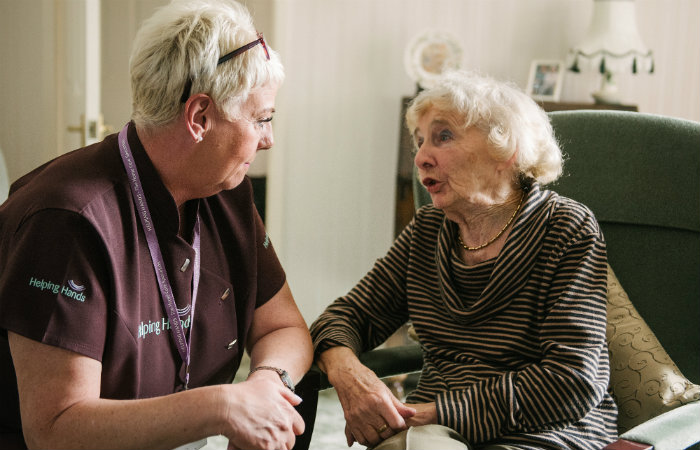As one of the UK’s leading Dementia Home Care Specialists, we understand how the effects of this group of conditions can impact upon people’s lives. We’ve created a series of blogs on the different types of dementia and how you and your family can live well with whichever condition you or your loved one has.
With 850,000 in the UK living with dementia and with this number set to rise to over 1 million by 2025, there is more need than ever to understand as much as we can about this condition and to work closer to a cure. Beginning with the most common type of dementia – Alzheimer’s – we explore what the condition is, symptoms and different treatment options.
Are Alzheimer’s and dementia the same?
Dementia is an umbrella term for a group of progressive conditions that affect the brain and can cause problems primarily with memory, concentration, thinking, language, perception, mood and behaviour. There are more than 100 different types of dementia, with Alzheimer’s being the most common – affecting 520,000 people in the UK.
So in essence, dementia is not the same as Alzheimer’s; dementia isn’t a condition in it’s own right and is actually better described as a group of symptoms caused by a condition such as Alzheimer’s.
As Alzheimer’s is the most common cause of dementia, it is the most talked about and perhaps the reason why many confuse the two different terms.
What is Alzheimer’s?
Alzheimer’s is a progressive condition that occurs in the brain and directly affects memory, cognition, and behaviour. Alzheimer’s isn’t a normal part of aging, yet it is the most commonly diagnosed condition for those aged 65 and over in the UK. The signs of Alzheimer’s can be quite subtle to begin with, but gradually worsen over time and affect everyday tasks such as personal care, eating and communicating.

Named after Alois Alzheimer, the German doctor who discovered the condition, Alzheimer’s occurs when a build up of protein forms abnormal plaques and tangles in the brain. This causes nerve cells to die and brain tissue to diminish. The death of these cells and tissue also affect the chemical signals within the brain, as nerve cells are vital for messages being passed on for the brain to work properly. Without them, signals aren’t passed on as successfully, which ultimately affects the brain’s ability to function.
The symptoms of Alzheimer’s
Initially, the early symptoms of Alzheimer’s are fairly mild and can sometimes be difficult to spot. Generally, the first area of the brain affected is the hippocampus, which is responsible for memory retrieval. This is usually the first thing that someone with early-onset Alzheimer’s or their family may notice first. It could start off quite small, like persistently losing keys, but can quickly spread to forgetting important dates, recent conversations or getting lost on a daily visit to the shops. Yet asking your loved one to recall events from years ago may be much easier, as the first part of the memory function to be affected is short-term or new memories.
As well as memory difficulties, the early stages of Alzheimer’s affects speech, concentration and the ability to judge distance, sound, and space (visuospatial ability). They may find it difficult to find the right word they are looking for or lose track of what they’re doing, even if it’s a straight-forward task like putting the laundry in the washing machine.
As time goes by, the damage to the brain progressively gets worse with more areas becoming damaged or shrinking. During the later stages of Alzheimer’s, people may experience difficulties with:
- Delusions – Believing things that aren’t true, for example, being convinced that someone is contaminating your food.
- Hallucinations – Seeing things that aren’t there, for example, hearing or seeing someone talk to you that isn’t there.
- Aggression – Becoming agitated and displaying both negative verbal and physical behaviour.
- Disturbed sleep – Taking naps throughout the day and continually waking up at night.
- Severe memory difficulties – Anything from not being able to wash, dress or even remember how to swallow or go to the toilet.
- Recognition – Being unable to recognise loved ones or remember their names.
- Speech – Inability to use the correct words or take part in conversations.
- Mood – Low mood, anxiety or depression.
Treatment for Alzheimer’s
As time progresses, damage to the brain unfortunately worsens as do the symptoms associated with the condition. Sadly, there is no cure for Alzheimer’s, but there are various medications and therapies available to ensure those with the condition live as well as possible.
To maintain the nerve cells and brain tissue for as long as possible, drug treatment targets the cells to increase their activity and ability to communicate with one another. This type of medication is usually prescribed during the early and middle stages of Alzheimer’s, and helps with memory problems, reducing anxiety and motivation.
In the later stages of Alzheimer’s, different drug treatments are used that target cognition and behaviour. These can help with daily activities such as washing, dressing and eating and also reduce challenging behaviours and delusions caused by the condition.
Alternative therapy such as using life story books or talking therapies can also help with emotional wellbeing and maintaining positive mental health for both the individual and their family & friends.
Being diagnosed with dementia can be quite upsetting for both you and your family, particularly as you start to come to terms with the symptoms and how it affects your life. Therapy such as counselling or Cognitive Behavioural Therapy (CBT) can be extremely beneficial when working through any negative emotions or feelings that you may have and is a safe environment for you to explore your thoughts.
Who Alzheimer’s affects
Alzheimer’s tends to affect those aged 65 and over, and the risk of getting the condition doubles roughly every five years. Although Alzheimer’s is generally thought of as a condition that affects older adults, it can be diagnosed in individuals younger than 65. There are over 400,000 in the UK who live with early-onset Alzheimer’s. Instead of the memory function being the obvious symptoms like in older adults, speech, vision or decision making behaviours are usually the first areas to be affected.
Living with Alzheimer’s can be incredibly difficult for both the person diagnosed with the condition and their loved ones. Helping Hands have worked with many families and individuals living with dementia, and advises how to come to terms with a diagnosis.
Our experts say: “Alzheimer’s isn’t the label that should just be attributed to everyone with the condition – people living with Alzheimer’s are human beings with their own personality, interests and identity. You’re still caring for a person and not the Alzheimer’s, which is the message that I try to give all who support family, friends or customers with the condition.
They continue: “Family members often say that their loved ones are not there anymore, and I disagree with this. It is the same person, but in their mind they have gone back in time. Instead of thinking of them as ‘lost’, I believe that they need to get to know their loved ones again and learn to live in their ‘reality’.”
People living with the latter stages of Alzheimer’s tend to require consistent monitoring and care. Helping Hands aims to ensure as many people living with Alzheimer’s and other types of dementia are able to live in the comforts of their own home for as long as possible. Whether that’s with the support of a visiting carer who pops in every day, or a live-in carer that will live with you or your loved one – routine and feeling safe is extremely important for those living with dementia.
To find out more about dementia and Alzheimer’s, visit our dedicated dementia page where you can find tips on living with the condition, download a Life Story Book template or arrange visiting or live-in care for you or your loved one.

